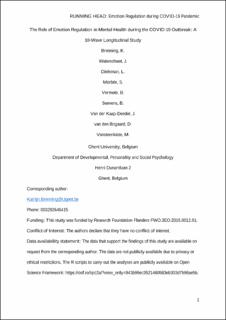| dc.contributor.author | Brenning, Katrijn | |
| dc.contributor.author | Waterschoot, Joachim | |
| dc.contributor.author | Dieleman, Lisa | |
| dc.contributor.author | Morbee, Sofie | |
| dc.contributor.author | Vermote, Branko | |
| dc.contributor.author | Soenens, Bart | |
| dc.contributor.author | Van der Kaap-Deeder, Jolene | |
| dc.contributor.author | van den Bogaard, Daphne | |
| dc.contributor.author | Vansteenkiste, Maarten | |
| dc.date.accessioned | 2022-11-24T10:18:02Z | |
| dc.date.available | 2022-11-24T10:18:02Z | |
| dc.date.created | 2022-10-06T14:53:57Z | |
| dc.date.issued | 2022 | |
| dc.identifier.issn | 1532-3005 | |
| dc.identifier.uri | https://hdl.handle.net/11250/3033838 | |
| dc.description.abstract | The COVID-19 pandemic elicited a lot of concerns among citizens, thereby potentially compromising their well-being. This study sought to examine the role of individuals' emotion regulation styles (i.e., emotional dysregulation, emotional suppression, and emotional integration) in handling these concerns and their experiences of well-being (i.e., satisfaction with life and sleep quality) and ill-being (i.e., anxiety and depressive symptoms). The study had a unique 10-wave longitudinal design (N = 986; Mage = 41.28; 76% female) and was conducted during the outbreak of the pandemic in March–May 2020. Multilevel analyses showed, first, that weekly variation in COVID-19 related concerns related negatively to weekly variation in well-being and positively to weekly variation in ill-being. Second, at the between-person level, emotional dysregulation and suppression related positively to between-person vulnerability in ill-being and lower well-being (across all waves). Third, between-person differences in emotional dysregulation amplified the strength of the within-person association between concerns and depressive complaints and lowered life satisfaction. Unexpectedly, integrative emotion regulation amplified the strength of the within-person association between concerns and anxiety. The discussion focuses on the critical role of emotion regulation in handling the uncertainty elicited by the pandemic and provides directions for further research. | en_US |
| dc.language.iso | eng | en_US |
| dc.publisher | Wiley | en_US |
| dc.rights | Navngivelse 4.0 Internasjonal | * |
| dc.rights.uri | http://creativecommons.org/licenses/by/4.0/deed.no | * |
| dc.title | The Role of Emotion Regulation in Mental Health during the COVID-19 Outbreak: A 10-Wave Longitudinal Study | en_US |
| dc.title.alternative | The Role of Emotion Regulation in Mental Health during the COVID-19 Outbreak: A 10-Wave Longitudinal Study | en_US |
| dc.type | Peer reviewed | en_US |
| dc.type | Journal article | en_US |
| dc.description.version | acceptedVersion | en_US |
| dc.source.journal | Stress and Health | en_US |
| dc.identifier.doi | https://doi.org/10.1002/smi.3204 | |
| dc.identifier.cristin | 2059260 | |
| cristin.ispublished | false | |
| cristin.fulltext | postprint | |
| cristin.qualitycode | 1 | |

